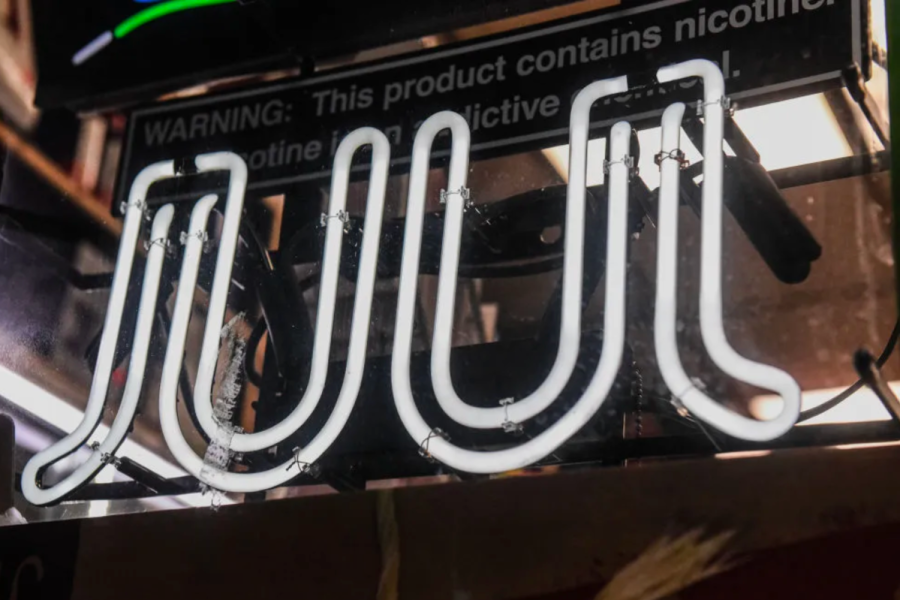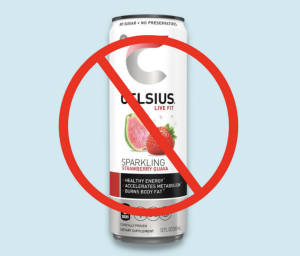JUUL settles for $438.5 million
The manufacturing company faces scrutiny after supposed unlawful marketing practices
September 28, 2022
Earlier this month, a costly settlement was reached in a multi-state inquiry into the marketing tactics of the e-cigarette manufacturing company, JUUL. This settlement totaled $438.5 million and involved payouts to a total of 34 states and territories.
This decisive ruling against the company comes as a retort of their controversial marketing practices, in which it is believed they unlawfully attempted to market the product to underage children. The current national legal age for the consumption of products containing nicotine is 21 and was made so as the result of legislation passed in Feb. 2019, which amended the Federal Food, Drug and Cosmetic Act to change the legal federal age.
Despite this landmark decision to change the legal age, which came in part of a government prerogative that looked to crack down on underage nicotine consumption, underage nicotine use has become more widespread in the last couple years as a result of the addition of these new and easily concealable e-cigarette products.
E-cigarette manufacturers like JUUL have greatly profited from this upward trend in use of these products. Before crackdowns such as the court case that they just settled, the net worth of this company peaked at $10 billion in Oct. 2020.
This enormous popularity emerged largely due to a deliberate marketing campaign targeted towards giving the product appeal to underage adolescents where JUUL utilized free samples, social media campaigns, lavish launch parties, discreet packaging and childish flavors, such as mango, cotton candy and other fruit flavors.
This youth targeted marketing campaign yielded unbridled success as it doubled the users of JUUL in the year from 2018 to 2019 and deeply embedded the product into teenage culture. Additionally, over half of respondents who had used JUUL, aged 15-17, had never used combustible tobacco before, indicating that JUUL was effectively enticing children that previously had not been at risk to start smoking to start.
JUUL did not only bring new users, it brought habitual users as well. According to a Truth Initiative study, 37.6 percent of current JUUL users in 2019 used it on 10 or more days of the month, thus indicating that they used this product habitually which is indicative of a growing addiction or reliance on the product for day to day functioning.
JUUL, which was initially brought to the market as a way to transition smoking adults off of the habitual use of cigarettes, faces a variety of reprimands in addition to the significant financial damage they will incur as a result of this settlement. This settlement will limit their ability to market to people under the age of 35, limit its presence in in-store displays, place a limit on online and retail sales and force them to undergo a retail compliance check based on strict protocols.
The heavy sanctions coming down as part of this lawsuit have virtually eliminated JUUL’s viability as a company in comparison to its presence and affluence that existed at the end of last decade. However, the product’s effects on the habits of underage adolescents appear to be both significant and lasting.
The effect of the marketing of harmful e-cigarette products to underage students can be seen in the biennial ACHA NCHA Survey II for the year 2020, which sampled 1138 students at GC. According to results from this survey 30 percent of college students used some form of tobacco or nicotine delivery products within the last 3 months, with e-cigarettes being used almost 3 times more frequently than traditional cigarettes.
GC students have a wide array of opinions on the use and marketing of JUUL and e-cigarette products in general.
An anonymous GC senior and business major calls vaping “a breath of fresh air” and cites it as a daily activity that allows him to be productive due to nicotine’s stimulant properties.
Two other GC Seniors recount their experiences with JUUL in high school, saying that it was considered completely normal to own and use one while in class which was made possible due to the ability to use this product discreetly with ease.
“Teachers didn’t even know what it was, so you could get away with charging it in class,” said an anonymous GC student.
Annie Siegel, a sophomore and marketing major, feels that it is a dangerous product that should not be allowed to be marketed to underage kids in the way that it is.
“I cannot believe e-cigarette products like Juul are allowed to be marketed in the way that they are, especially given what we know about smoking’s and nicotine’s detrimental effects on long term health,” Siegel said.
Despite the fact that JUUL is now facing discipline for its controversial marketing practices, the full effect on individual health and society as a whole due to the increased use of this product by underage people as a result of these practices remains to be seen.







